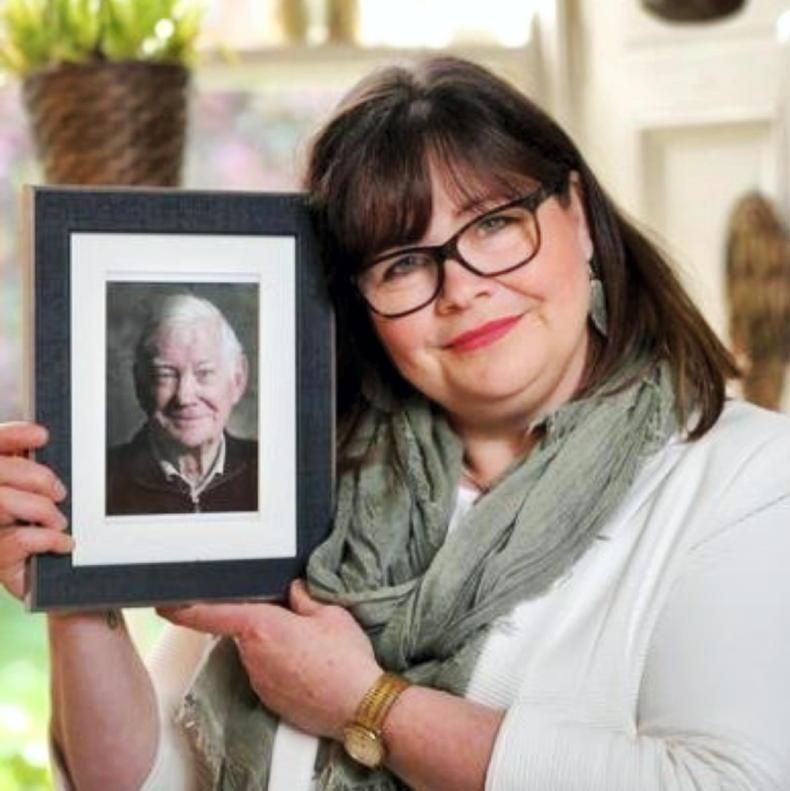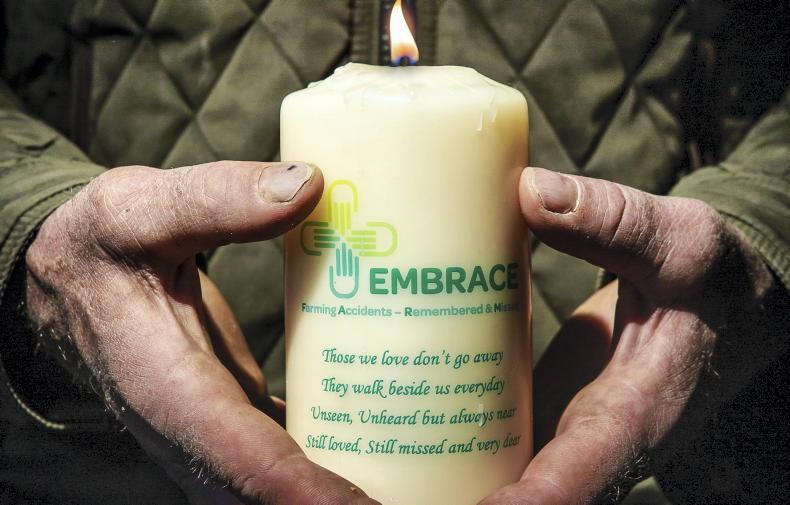It has been an extremely hard year for farmers regarding farm income and financial stability. With the uncertainty of milk prices, increased input costs and the reduction of nitrogen, many farmers are dealing with added stress and external pressures. This in turn can have a negative impact on farmers’ mental health and well-being.
About the webinar
HUGG, Ireland’s national suicide bereavement charity and Embrace FARM, the bereaved and injured farm family support network recently joined forces to provide an online webinar, which took place on Wednesday 28 November. As November was the month of remembrance and a time when farming practices may change for the winter, they felt it was an appropriate time to host the event.
More than 90 farmers across Ireland who have been directly or indirectly affected by suicide and bereavement attended the information evening.

Norma Rohan, Co-Founder of Embrace FARM.
“It is the collaboration of two charities coming together to provide as much information and support to the farming community as possible,” says Norma Rohan, Co-Founder of Embrace FARM.
Norma hopes that people realise there is somewhere you can turn to — you don’t have to cope with bereavement on your own.
“When you go through something traumatic as a family — it is probably your first time going through it — you are going to act a certain way and that is something you might not be familiar with,” says Norma.
“These are all normal feelings you have — realising that can go a long way in helping people cope, when they understand how what they’re feeling is normal. There is light at the end of the tunnel, in the sense of there are people there to support you, if you want them to.”

Liz Gleeson, Psychotherapist, Lecturer and Grief and Loss Specialist.
Take away messages
Liz Gleeson, psychotherapist, lecturer and grief and loss specialist says, “Almost a quarter of all Irish farmers have suicidal ideation.”
That means farmers think about suicide as a possible option to get away from their problems or overwhelming feelings.
“Suicide in the Irish farming community is a significant area of concern,” she says.
In her talk, Liz spoke about the needs of bereaved people. Some 60% of people dealing with a bereavement will not need professional support (and shouldn’t be pushed into it); 30% will need additional support; and 10% will develop prolonged grief disorder. But 100% of people dealing with a bereavement will need acknowledgement of their loss, support from family, friends and community and information about grief.
Speaking about the reasons why farmers are more at-risk of suicide, Liz outlined the following points:
Farm life is often socially isolatingThe work can be relentless and it is often difficult to get any real break
Many farmers work alone and bear the burden of responsibility for the farm alone
Sometimes crop or herd outcomes are out of their control — loss of agency
Cost of running a farm, financial uncertainty, expensive equipment or machinery
Family conflicts are more common
Outdated traditions and farming culture may lead to lack of support
Breaking of traditions — adult children move away or choose different lifestyles
“Grief is a normal, adaptive response to loss,” says Liz. “Suicide bereavement can often have a greater impact than other losses. When someone close to us dies by suicide, our life often changes dramatically. We don’t ‘bounce back’ or ‘get over’ this loss, but we slowly get used to it, adapt to the changes in our lives and learn to live with them”.
Further research needed
The mental health crisis that exists within farming is being spoken about now within the farming circle. That is a positive thing, says Norma, as a couple of years ago they didn’t know the scale of the problem regarding farmers’ mental health and suicide rates.
Now Teagasc and the Central Statistics Office (CSO) are working on compiling data and research on the impact death by suicide is having on the farming community.
“We all hear stories in our local communities — what we really need now is further data and the facts and figures to come out to say how big of a scale this problem is and is it worse than any other sectors in our society at the minute,” says Norma.
Support lines
HUGG support@hugg.ie 015134080
Embrace FARM info@embracefarm.ie 0857709966
Samaritans jo@samaritans.org 116123
Irish Hospice Foundation bereavement support line 1800807077
Read more
Meet The Maker: ceramic artist, Cora Cummins
It has been an extremely hard year for farmers regarding farm income and financial stability. With the uncertainty of milk prices, increased input costs and the reduction of nitrogen, many farmers are dealing with added stress and external pressures. This in turn can have a negative impact on farmers’ mental health and well-being.
About the webinar
HUGG, Ireland’s national suicide bereavement charity and Embrace FARM, the bereaved and injured farm family support network recently joined forces to provide an online webinar, which took place on Wednesday 28 November. As November was the month of remembrance and a time when farming practices may change for the winter, they felt it was an appropriate time to host the event.
More than 90 farmers across Ireland who have been directly or indirectly affected by suicide and bereavement attended the information evening.

Norma Rohan, Co-Founder of Embrace FARM.
“It is the collaboration of two charities coming together to provide as much information and support to the farming community as possible,” says Norma Rohan, Co-Founder of Embrace FARM.
Norma hopes that people realise there is somewhere you can turn to — you don’t have to cope with bereavement on your own.
“When you go through something traumatic as a family — it is probably your first time going through it — you are going to act a certain way and that is something you might not be familiar with,” says Norma.
“These are all normal feelings you have — realising that can go a long way in helping people cope, when they understand how what they’re feeling is normal. There is light at the end of the tunnel, in the sense of there are people there to support you, if you want them to.”

Liz Gleeson, Psychotherapist, Lecturer and Grief and Loss Specialist.
Take away messages
Liz Gleeson, psychotherapist, lecturer and grief and loss specialist says, “Almost a quarter of all Irish farmers have suicidal ideation.”
That means farmers think about suicide as a possible option to get away from their problems or overwhelming feelings.
“Suicide in the Irish farming community is a significant area of concern,” she says.
In her talk, Liz spoke about the needs of bereaved people. Some 60% of people dealing with a bereavement will not need professional support (and shouldn’t be pushed into it); 30% will need additional support; and 10% will develop prolonged grief disorder. But 100% of people dealing with a bereavement will need acknowledgement of their loss, support from family, friends and community and information about grief.
Speaking about the reasons why farmers are more at-risk of suicide, Liz outlined the following points:
Farm life is often socially isolatingThe work can be relentless and it is often difficult to get any real break
Many farmers work alone and bear the burden of responsibility for the farm alone
Sometimes crop or herd outcomes are out of their control — loss of agency
Cost of running a farm, financial uncertainty, expensive equipment or machinery
Family conflicts are more common
Outdated traditions and farming culture may lead to lack of support
Breaking of traditions — adult children move away or choose different lifestyles
“Grief is a normal, adaptive response to loss,” says Liz. “Suicide bereavement can often have a greater impact than other losses. When someone close to us dies by suicide, our life often changes dramatically. We don’t ‘bounce back’ or ‘get over’ this loss, but we slowly get used to it, adapt to the changes in our lives and learn to live with them”.
Further research needed
The mental health crisis that exists within farming is being spoken about now within the farming circle. That is a positive thing, says Norma, as a couple of years ago they didn’t know the scale of the problem regarding farmers’ mental health and suicide rates.
Now Teagasc and the Central Statistics Office (CSO) are working on compiling data and research on the impact death by suicide is having on the farming community.
“We all hear stories in our local communities — what we really need now is further data and the facts and figures to come out to say how big of a scale this problem is and is it worse than any other sectors in our society at the minute,” says Norma.
Support lines
HUGG support@hugg.ie 015134080
Embrace FARM info@embracefarm.ie 0857709966
Samaritans jo@samaritans.org 116123
Irish Hospice Foundation bereavement support line 1800807077
Read more
Meet The Maker: ceramic artist, Cora Cummins








 This is a subscriber-only article
This is a subscriber-only article










SHARING OPTIONS: